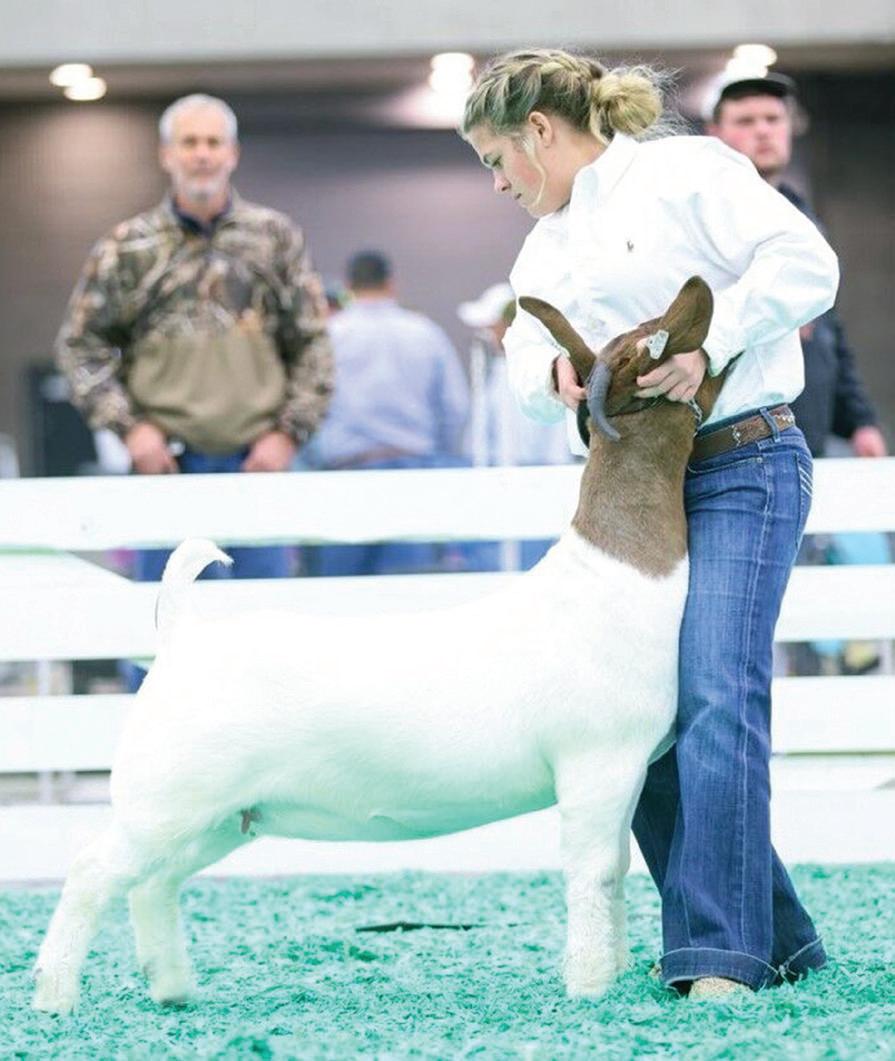AGRICULTURE

















The Northeast Tennessee AgResearch and Education Center (NETREC) continues to serve as a research hub for the present and future of farmers in the region, the state and the nation at its East Allens Bridge Road facility.
The facility, which sits on about 500 acres, was established in 1932 to research tobacco, but now conducts studies and experiments in a myriad of agricultural commodities and sciences.
The research center is supported by the University of Tennessee Institute of Agriculture, and is the only center east of Knoxville.
“During drought conditions or during the warm summer months it does not grow well. It is a cool weather grass. That can affect an operation’s productivity and efficiency,” McKinney said. “Warm season native grass will thrive where the fescue is not thriving.”

“The current chancellor on campus in Knoxville talks about how the University of Tennessee is on the rise, and I really think that that slogan is applicable to the Northeast Tennessee AgResearch and Education Center,” Justin McKinney, the center’s director, said. “We’re on the rise. We’ve been able to get more faculty involved in more of their research endeavors here and we’re investing in our infrastructure.”
Numerous agricultural science activities are being conducted at the research center ranging from cattle studies to grassland research.
The center is part of a $30 million grant received by the University of Tennessee Institute of Agriculture from the United States Department of Agriculture for a climate-smart grassland partnership study.
The University of Tennessee is the lead partner on the project that includes several states throughout the southeast.
The study will test warm season native grasses and tall fescue grass to discern what grass species exhibit better efficiency in carbon sequestration and productivity.
“Regenerative agriculture is a term that gets used a lot, but to me that is nothing more than sustainable agriculture. We want to put science behind it. We are trying to put science behind the regenerative agriculture term,” McKinney said. “Climate change is something that our society and consumers are concerned about, so we’re seeing what can agriculture do to contribute to that in a positive way.”
McKinney noted that Tennessee is in the “fescue belt” and that the grass was “a very beneficial forage species,” but that it is not perfect.
Paddock development for the study began at the NETREC in 2023, covering about 75 acres, and the study is expected to begin in earnest in April.
Also in 2023, the NETREC worked in partnership with the University of Tennessee’s College of Veterinary Medicine to study endemic diseases in cattle herds.
“A lot of universities look at diseases on an individual level in cattle, but we have been able to look at it at a herd level,” McKinney said.
The cattle have been at the research center throughout 2023 divided into herds of 20 to 30 animals using a large paddock system, meant to reflect the herd size of many east Tennessee farmers.
Researchers are studying how certain diseases move through herds and collect data and measurements. Heifers are also being studied throughout their gestation periods before they have their first calves. Those calves are then also being studied.

research studies usually does not come with funding to invest in the facility’s infrastructure, which is needed to continue the center’s work into the future.
“That ARP money is allowing us to reinvest in the center,” McKinney said. About $50 million in funding is being split across the 10 research centers in the state.
McKinney called the funding “a blessing” and “a shot in the arm” for the local research center.
The money will fund numerous facility improvements at the center including two new state-of-the-art glass

The research is meant to help develop disease prevention strategies for diseases that farmers have to contend with on their farms.
That study, which was also facilitated through a USDA grant, will conclude in April.
In the coming months, the NETREC will begin undergoing extensive facility improvements thanks to funding distributed from the American Rescue Plan act, which will help the center further its research efforts.
McKinney said that grant funding for


greenhouses, which McKinney referred to as the “gateway” for the center’s research in crops such as soy beans and tobacco.
The new greenhouses will help the University of Tennessee’s breeding program with a winter nursery. Currently, products are sent to subtropical Puerto Rico, but once the new greenhouses are in place, all work will be able to be conducted at the Greene County research center.
The new greenhouses will replace greenhouses built in the 1940s and 1960s.
In the coming year, the ARP funding will also pay for the construction of a backgrounding barn for the center’s cattle operation and for a commodity barn to store food and reduce spoilage of crops fed to the cattle. A centralized beef handling facility will also be constructed at the center.
Equipment is also being purchased with the funding, including precision agricultural tractors and plot combines. One plot combine has already been purchased and is in use at the center.
“We can use it to harvest and cut beans and corn, and those are the primary crops that we use to feed our cattle,” McKinney said.
The ARP funding will allow the research center to make upgrades that would have taken over a decade in only a year or so.
“We couldn’t do any of that without that ARP money,” McKinney said.
The research center will also be seeing the arrival of sheep in April thanks to a small ruminants grant through the USDA’s Natural Resources Conservation Service. The grant will result in 100 katahdin sheep coming to the center to study how they graze on fescue, switchgrass, big bluestem and little bluestem, according to McKinney.
The center continues to be the sole source of “UT Beef” for University of Tennessee, Knoxville catered dinners and dining halls. The center now also has four years of soybean growth and production data that local farmers can access to see what varieties are most successful in growing and producing in the area.
The NETREC has continued to evolve and diversify its research portfolio while strengthening its position in the agricultural research space. Concerns over the usefulness of the research center after tobacco no longer dominated the commodities market have now dissipated as the center has developed new programs and interdisciplinary research areas, in addition to tobacco research.
McKinney said that the center is slowly adding job positions back, and that he hopes to add even more in the future. He also noted that the center is often busy with graduate students and principal investigators conducting research work.
“We’ve grown, and we’ve been able to grow at a rapid speed, really. We are very blessed. We are a research center on the rise and that matches the motto of the chancellor,” McKinney said.
McKinney said that the NETREC served upper east Tennessee and Greene County with “honor and prestige” for decades, and that those at the center are thankful for the local community’s support in Greene County and Greeneville.
“We are happy to be doing this research here. We want to serve our producers and improve the farm gate value that they have at their individual farms,” McKinney said. “I really can’t say how much we appreciate the support of the local community. They are key players to make sure that we have support here and coming out of Knoxville. The work here is a service for them.”
McKinney encouraged those in the local community to stop by the NETREC to ask questions or to call the center at 423-638-6532 to set up a tour.
“I have an open door policy, and I’m always happy to talk about the work we’re doing at the center and answer any questions,” McKinney said.














usda.gov/AgCensus .
Agriculture is big business in Greene County, according to data released in February by the Greene County Partnership.
Greene County has the most farms in Tennessee at 2,344 operating on 209,228 acres. This compares to second-place Giles County at 1,457 farms, according to the data from the 2022 census by the U.S. Department of Agriculture.
The data was shared by GCP staff member Kendra Hopson, who holds a degree in agricultural economics from the University of Tennessee and is a young, female farm owner in Greene County.
Other notable facts about Greene County include:
Annual agricultural sales total $69,743,000; About 52.5% of Greene County is farm land;
In 2017 there were 2,562 farms operating on 221,601 acres, and in 2012 there were 2,529 farms operating on 226,003 acres;
Greene County has the most female producers at 37%. Of the 3,909 people considered farm producers, 1,451 of them are female;
Greene County has the second-most number of cattle in the state with a total of 61,044 cattle/calves; Greene County harvested 138,754 tons of hay/silage; Tennessee only has 241 farms reportedly growing tobacco. While Greene County did report some farms, it is one of the lowest among the few counties still producing;
Greene County has the third most honeybee colonies in the state at 978;
Greene County has the highest number of milk goats; Greene County farms have the third highest inventory of horses and the highest inventory of donkeys/ burros/mules;
Greene County harvested 493,889 bushels of corn and 110,694 bushels of soybeans;
A total of 3,024,471 broiler chickens were raised for meat; When it comes to young people farming, 26.8% of the total farm land, representing 691 farms and 1,050 producers, are new/beginning producers, with people under 35 owning nearly 30,000 acres.
The 2022 Census was published Feb. 13, and this is the most up to date, comprehensive data available, Hopson said. The census is conducted every five years. These are just a few stats – the full 829 page report drills down to farm expenses by county, many specific crops and animal production, and comparative data to the 2017 report.
The full report is available online at www.nass.

The Greene County Partnership operates the Agribusiness Committee, which promotes agriculture and includes individuals representing agriculture,
businesses and state offices, as well as dairy and beef farmers. The committee hosts various events each year that focus on promotion of farmers and agriculture.

























































































Cannon Wilhoit, a goat farmer since age 7, won a prestigious state award in 2023.
Wilhoit, a student at South Greene High School, received the State Star Greenhand award during the 95th Tennessee Future Farmers of America (FFA) Convention held in Gatlinburg.
The award recognizes outstanding ninth-graders in FFA, promotes excellence, and encourages further development for new FFA members who are developing their Supervised Agricultural Experience (SAE) program, leadership skills, and general knowledge of FFA.
Each FFA chapter in Tennessee can submit one applicant for the award each year.
The Tennessee FFA Association consists of more than 27,000 members from nearly 300 chapters.
In a Facebook post about Wilhoit’s award, SGHS Principal Lori Wilhoit said, “She is an amazing young lady who has worked very hard! South Greene is super proud of you Cannon!” Principal Wilhoit also gave a “huge shout out” to Cannon Wilhoit’s fellow FFA members and FFA advisors Chelsay Burns and Jeremiah Harrison.
“To win the Tennessee FFA Star Greenhand award is an incredible achievement, as it represents the best first-year FFA member and their agricultural project in the entire state,” Burns said.
Star Greenhand award winners must
demonstrate leadership within FFA and have a strong Supervised Agricultural Experience, which is their individual agriculture project outside of school. Each region of Tennessee has one student to represent at the state level. They must have a rigorous application, interview with agricultural industry leaders, and test their knowledge of FFA and Tennessee agriculture. Wilhoit’s SAE is Goat Production Entrepreneurship. She owns and operates a herd of 65 commercial and registered goats, which vary from boer goats to multiple dairy breeds. She sells the commercial goats and breeds and raises registered boer goats for stock shows.
She assumes the financial risk for the herd. She has a high-quality embryo transplant program that is continuously growing in efficiency, Burns said. There are many management tasks that go into her daily chores like hair care, leading, and cleaning pens and the barn.
She has learned better management skills, responsibilities, and how to continually grow within the industry through this award area, Burns said. To be eligible for the Star Greenhand award, students must have earned the Greenhand degree at the chapter level and participated in at least five FFA activities at the chapter level and at least two FFA activities above the chapter level.
Entries are judged on a point system of 150 points, including 100 points for the application, 25 points for an exam, and 25 points for an interview.
The application includes a personal history portion, written in essay style, and Wilhoit’s begins, “Some students play sports, but for me, raising and showing goats is my sport.”
Wilhoit wrote that her passion for livestock began when she was invited to a county fair where she was able to show three different goats.
“I aggravated my parents everyday for two weeks asking to find a goat for me to show. Little did I know then, that this passion would take me across the country, win national titles, and help me become who I am today,” she wrote.

She explained in her personal history that at first she wanted to show steer like her father, but her smaller stature didn’t make that possible.
“I am now grateful for my vertical challenges as I would not have been able to discover my passion, which is the goat industry,” she wrote.
She said she puts in long hours at the barn to make sure every member of her herd is healthy and taken care of.
“Even though I started out with a small operation, I have really pushed and worked to ensure that my herd progressed into what it is now,” she wrote.
Wilhoit plans to attend veterinarian school and specialize in small ruminant reproduction.
“With all the opportunities that I
have had, I am so grateful that I was asked to show that goat seven years ago. I really don’t know what I would do without the agricultural industry in my life. Not only has my SAE provided me great opportunities, but it has helped me to become the person I am today. Not just the livestock industry, but agriculture as a whole continues to teach me lessons to make me a better person,” she concluded in her personal history.
Wilhoit is the daughter of Robert and Suzanne Wilhoit. She expressed thanks to her parents and her FFA advisors, Harrison and Burns.
For more information on Tennessee FFA, visit tnffa.org .














4-H is making a comeback in Greene County.
The organization, which has been around in Greene County for decades, is experiencing a resurgence in membership and participation after some struggles in recent years, particularly through the COVID-19 pandemic.
Christian Dalton was hired as Greene County’s 4-H Youth Development Extension Agent in May 2022, and 2023 was a year of revitalization and growth for the program.
When Dalton began working in Greene County, 4-H had about 97 kids involved in programming and only two groups or clubs meeting regularly.
Now, there are over 600 kids involved in 4-H in Greene County and around 40 different groups.
“We’ve grown a lot. We’ve got about 600 kids involved right now in some capacity, whether that be judging teams, the fair or those in classroom groups where we come in and teach and do ag lessons and such,” Dalton said during an interview in February. “About 45 different groups of some type are meeting pretty regularly right now. We’ve grown quite a bit from where we started with.”
Dalton credits the growth of 4-H to the organization being active in local schools once more, and he’s grateful for teachers who allow him to work with their classes. 4-H programs and clubs typically meet once per week or once per month and are available for kids and teens ages 9-18. 4-H Cloverbud programs are available for kids ages 5-8. Programming helps kids learn about agriculture, STEM, and other life skills such as speaking and how to tie a tie.
“I think a lot of it is going into the schools again. We have about 45 groups and about 40 are in schools. Those in-school groups can be during the school day, after school programming, enrichment times or RTI times. We go in for a lot of different reasons,” Dalton said. “A lot of those teachers that had 4-H when they were young or had it years ago when it was still strong here, I’m grateful for them just
having faith and asking me to come out.”
4-H programming is now in six of seven different schools, according to Dalton, covering different grade levels and some grade levels entirely.
“4-H is for everybody, and the wider the net we can cast, the wider we can program and the more people can learn about it,” Dalton said.
Dalton said 4-H is particularly busy in local middle schools, meeting with children who missed out on having their first experience with 4-H in fourth grade, which is traditionally the
allotment of spots for Greene County children to go to 4-H Camp in the summer also grows.
The more kids that are involved in local programming, the more guaranteed spots the 4-H Camp Greene County is able to secure.
Five counties attend the camp jointly, and allotments are determined by the number of kids enrolled in a county’s programming.
“Greene County just hadn’t had a lot of kids involved for so long that we got our number cut back,” Dalton said. “We had an increase in spots of

first time students get involved in the program.
4-H clubs outside of schools have also grown. The local 4-H shotgun club “has gotten a lot bigger” according to Dalton. The club had six or seven members in May 2022 and now has 15 or 16 members. Judging teams, such as livestock judging, have also grown substantially. New judging teams dealing with horses, wildlife and dairy have also been introduced and are “all going strong.”
As 4-H gains more members, the


what we can take to camp this year, so that’s a big deal.”
The number of spots for Greene County’s kids has grown each of the past two years.
In 2022, only 31 Greene County children attended summer 4-H Camp at Clyde-Austin 4-H Center. In 2023 that number grew to 51. In 2024, Greene County will have up to 70 spots to fill thanks to more participation in local programming. Dalton has hopes for even higher numbers in the future.
“We’ve got up to 60 to 70 spots to fill this year, and I think we are going
to fill those pretty handily, I hope,” Dalton said. “In reality Greene county will probably have about 100 spots per year at some point.”
Dalton said he spread the word about camp while visiting local schools, and has had help from many local organization and sponsors that have provided scholarships for children who otherwise may not have been able to afford camp.
“With Greene County Livestock Association, Greene County Farm Bureau, The Terry Law Firm. We have had several sponsors who have stepped up to throw money in because they know how important 4-H Camp is to these kids. It’s helped a lot,” Dalton said.
Dalton noted that 4-H and Future Farmers of America also have strengthened their relationship and work together to benefit the students of Greene County.
The annual “chick chain” program was held in conjunction with all four FFA chapters in Greene County in its past two installments.
The “chick chain” involves 4-H youths purchasing baby chicks and raising them on their own as they learn about raising a farm animal. After a few months, the chicks are then brought to an auction and sold.
The program included 30 students and 25 students in the last two years respectively, and Dalton says that is the highest level of participation in the program in around a decade.
Dalton called 4-H’s relationship with local FFA chapters, “incredible.”
“I think we’re one of the most fortunate counties in northeast Tennessee that we all work together so well. Any of the four schools I go to that we need to work together on something, they always ask what they can do and what I can do, and we get together,” Dalton said.
Recently, around 100 local high school students in the 4-H Honor Club and the four FFA chapters traveled jointly to the University of Tennessee Herbert College of Agriculture. Dalton said students were able to tour the ag campus, meet with professors























and take a behind-the-scenes turf grass tour of Neyland Stadium.
“That was pretty cool that we got that worked out all working together,” Dalton said.
Dalton has listened to advice from the community and the 4-H advisory committee in working to grow the organization locally.
“4-H at its core is about life skills, and I think those are never going to go out of style. Things like communication and body language. We come in and find a fun way to teach kids how to properly use their voice to speak up, how to talk and how to present themselves. We ask teachers, parents, and community sponsors what they see the biggest needs are, and I build programming based on that,” Dalton said. “It makes a big difference that we’re hitting those things that are needed instead of just throwing things out there.”
Dalton said he also works with kids’ schedules as best as he can so they can still participate in 4-H while doing other extra-curricular activities.
“You have to be flexible and understand that these kids have busier lives than we do anymore,” Dalton said. 4-H has programming in both city
and county schools currently. However, as it expands, the organization is looking to bring in an additional 4-H agent through Tennessee State University for the first time in over 25 years.
“We’ve decided with this many schools and all the kids – I think there were 13,000 in Greene County in the last census – we should get some more help to back us up and share the load to hit all these schools,” Dalton said.
Dalton said that a new wildlife exhibit was being placed at the 4-H camp and he was also excited for a new pavilion at the former Takoma Hospital campus now owned by Greene County.
The structure is being paid for through a grant, and will serve as an outdoor learning center and demonstration pavilion. The pavilion will be used by the University of Tennessee Agricultural Extension office, 4-H Youth Development Program, and Greene County in general.
Dalton said he hopes the pavilion is completed by fall 2024.
In 2022 when he took the reins of Greene County’s 4-H programming, Dalton said he wanted kids and adults alike in the community to recognize the 4-H clover and know what it

means. He believes that the local organization is making its way toward that goal.
“I don’t want to be just grateful for what we’ve got. I think we’ve got a long way to go, but I think we’ve got a good start. I think when all fourth through eighth graders in Greene County can say they’ve seen that clover and know what it means, I think we’ll have done it. Right now we’ve probably got about a third that can do it. That’s amazing because we didn’t have that when we got here,” Dalton said.
Dalton said that positive word of mouth and more visibility has helped 4-H grow.
“I think it’s one of those things that people in the community are talking about and taking notice of. That’s a big part of it. Just having people know that we are doing well and people knowing that 4-H is back and doing well is huge. It’s important that people know that we’re back and that we’re not the same old same old. That we’re growing and changing and adapting and doing whatever we need to do to make sure we’re the best for Greene County. That’s the biggest thing right now,” Dalton said. “We’re glad we’ve grown.”
The University of Tennessee has an “ag-business formula” that calculates what the “volunteer value” is to a county based on volunteer hours, according to Dalton, and in 2023 local 4-H participants brought a monetary payback of $18,000 to Greene County through volunteering.
“That’s a good number. That’s with 600 kids involved. If we get up to what we should be at with 1,500 kids or more, thats big value we can get back,” Dalton said.
A growing number of 4-H clovers are budding in Greene County, and while it may seem like daunting number, Dalton thinks that getting 1,500 local kids involved in 4-H is attainable, and he believes that having 4-H kids give back makes the program even more special.
“It’s not just me going in there and teaching them how to tie a tie. They are giving back to their communities too. That’s a big part of it,” Dalton said.
Those wanting to learn more about 4-H in Greene County can stop by Dalton’s office at 204 N. Cutler St., call him at 423-812-2082 or send him an email at cdalton@utk.edu.
























KNOXVILLE – From increased agricultural commodity competition to the resumption of wheat and corn exports from Russia and Ukraine, global market forces delivered a hit to Tennessee’s agricultural sector in 2023. Researchers and Extension specialists from the University of Tennessee Institute of Agriculture provide an analysis of these challenges and their impact in a recently released economic report to the governor.
Prices received by Tennessee producers are influenced by local, national and global market forces. Prices declined in 2023, primarily due to record corn and soybean production in Brazil and a resumption of wheat and corn exports from Russia and Ukraine, along with weak export demand.
Concerns over the global economy and inflation continue to influence commodity prices and the agricultural sector. Currently, 2023 marketing year average corn prices are 10% below the five-year average and 34% below 2022; soybean prices are 14% above the five-year average and 9% below 2022; wheat prices are 12% below the five-year average and 34% below 2022; and cotton prices are 13% above the five-year average and 2% below 2022. Although prices are lower compared to last year, average yields for corn, cotton, soybean and wheat were near state records, which should help row crop farmers produce another profitable year.
According to the report, marketing year average prices for the 2023-2024 marketing year will be influenced by South American production, U.S. export demand and 2024 planting intentions for major crop commodities in the Northern Hemisphere. Tennessee farm-gate prices for the 2023-24 marketing year are projected to be
$5.50-$7 for wheat; $4-$5.50 for corn; $11.50-$13.50 for soybeans; and 75 cents to 90 cents for cotton. “Volatility in commodity prices is likely to persist in 2024, largely due to global economic uncertainty and uncertainty in production,” said crop marketing specialist Aaron Smith in the UTIA Department of Agricultural and Resource Economics.
The livestock industry saw U.S. beef exports from January through August 2023 decrease 12.3% compared to 2022.
Total beef export value over the first eight months of 2023 totaled $6.69 billion, a decrease of 18.8% compared to 2022.
Pork exports during the first eight months of 2023 were 10.6% higher than 2022 with export values totaling $5.32 billion, an increase of 8.3% compared to 2022.

“Cattle prices are expected to plateau in 2024 but remain strong relative to recent years,” said livestock specialist Andrew Griffith, also in the UTIA Department of Agricultural and Resource Economics. “Red meat demand should support beef and pork prices, as demand has remained strong and total production will moderate.”
Total 2023 U.S. agricultural and related exports were down 9% when
compared to 2022 due to lower volumes and lower prices, decreasing the value of U.S. exports. The factors affecting exports at the national level also affected Tennessee. Although the state’s agricultural and related exports were $3 billion, up $337 million or 13% when compared to the previous fiscal year, Tennessee experienced decreases in all major categories, except for consumer-oriented agriculture, which was up $437 million or 34%. The overall increase in exports this fiscal year was due to exports of distilled spirits. Key exports for the state included distilled spirits at $1.2 billion and cotton at $846 million, which increased by $477 million and decreased by $37 million, respectively.
Exports of bulk agricultural commodities, which include cotton, tobacco and soybeans, totaled $956 million, down $6 million or 1%; exports of intermediate products such as soybean meal and oil and other feeds totaled $177 million, down 23%; and related-product exports, which are mostly forest products, totaled $158 million, down 21%. Tennessee continues to be a leading exporter of forest products at $156 million, despite the 21% decline compared to the previous fiscal year.
This year’s report also delineates the alarming loss of agricultural land in Tennessee. From 1997-2017, 1.1 million acres of farmland was converted to other uses, mainly residential. The amount of farmland lost was equivalent to 55,601 acres per year, 152 acres per day, and 6.3 acres per hour. These losses picked up speed from 20172022, with farmland loss increasing to 86,588 acres per year, 237 acres per day, and 9.8 acres per hour. In 2020, the American Farmland Trust ranked Tennessee as the fourth most threatened state for farmland conversions.
Despite a difficult year, Tennessee’s agri-forestry industrial complex continues to bolster the state’s economy, directly and indirectly contributing $89 billion. Agriculture generated $65.6 billion in output and supported 281,794 jobs. The state will also benefit from recently received rural infrastructure funds to improve highways, bridges and water and broadband infrastructures.
Agricultural analyses from the UTIA Department of Agricultural and Resource Economics are included in the 2024 Economic Report to the Governor of the State of Tennessee prepared by the Boyd Center for Business and Economic Research at the UT Haslam College of Business. The following faculty contributed to the agricultural section of the report: Andrew Muhammad, Andrew P. Griffith, David Hughes, Charley Martinez, R. Jamey Menard, Aaron Smith, Sreedhar Upendram and T. Edward Yu.
The University of Tennessee Institute of Agriculture is comprised of the Herbert College of Agriculture, UT College of Veterinary Medicine, UT AgResearch and UT Extension. More on the Institute of Agriculture is on its website at utia.tennessee.edu .
